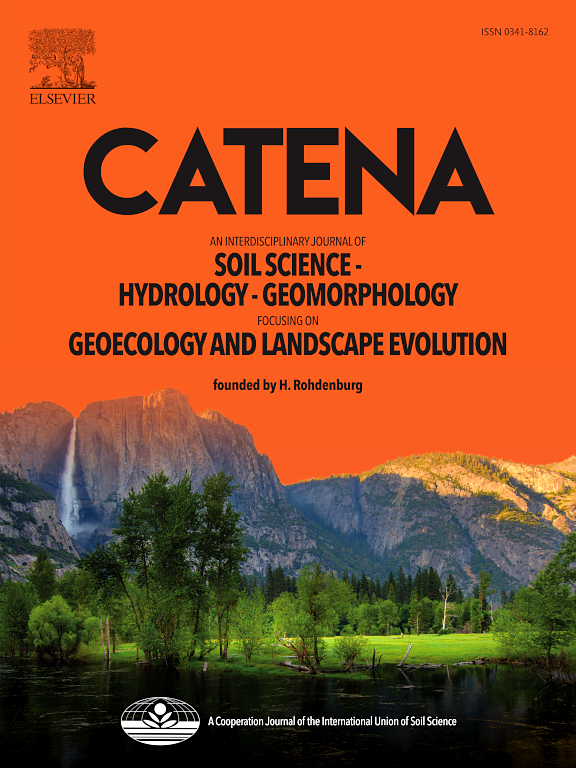Spatial downscaling of SMAP soil moisture to high resolution using machine learning over China’s Loess Plateau
IF 5.4
1区 农林科学
Q1 GEOSCIENCES, MULTIDISCIPLINARY
引用次数: 0
Abstract
Soil moisture (SM) is a critical physical parameter in land surface processes that affects the atmospheric and hydrological cycles. Soil Moisture Active Passive (SMAP) mission produces high-quality global SM data, but its low spatial resolution limits the applications at a regional or local scale. In this study, we developed a novel method to select optimal factors from 34 candidate downscaling factors for each month using three machine learning methods (Back Propagation Neural Network (BPNN), Support Vector Machine (SVM) and Random Forest (RF)) to produce monthly time series SM products at a spatial resolution of 1 km for the entire Loess Plateau in China from 2015 to 2023. 11 in-situ SM measurements distributed in Loess Plateau and precipitation data were used to evaluate the downscaling performances of the three machine learning approaches. The results show that the spatial trends of the three downscaled SM were essentially the same as the SMAP SM, with similar spatial patterns, and all three downscaled SM can provide more spatial information and texture features than SMAP SM. Among the three types of downscaled SM, the RF downscaled SM reached the highest R (0.654) and the smallest unbiased Root Mean Square Error (ubRMSE) (0.044 m3m−3), better than the BPNN and SVM downscaled SM, and most closely matched the in-situ measurements. The dynamics of SM were successfully captured by RF downscaled SM, which exhibited strong temporal consistency with the in-situ SM and responded well to precipitation events, with significant increases in SM values in the month of high precipitation and subsequent months. In conclusion, the RF model has the best downscaling effect and it can be used to provide high spatial resolution SM data for applications at a regional or local scale across the Loess Plateau.
利用机器学习将中国黄土高原上的 SMAP 土壤湿度空间降尺度至高分辨率
土壤水分(SM)是影响大气和水文循环的陆地表面过程中的一个关键物理参数。土壤水分主动被动(SMAP)任务可生成高质量的全球土壤水分数据,但其空间分辨率较低,限制了其在区域或地方尺度上的应用。在这项研究中,我们开发了一种新方法,利用三种机器学习方法(后向传播神经网络(BPNN)、支持向量机(SVM)和随机森林(RF))从 34 个候选降尺度因子中为每个月选择最优因子,以 1 千米的空间分辨率生成 2015 至 2023 年中国整个黄土高原的月度时间序列 SM 产品。利用分布在黄土高原的 11 个原位 SM 测量数据和降水数据来评估三种机器学习方法的降尺度性能。结果表明,三种降尺度SM的空间变化趋势与SMAP SM基本一致,具有相似的空间模式,并且三种降尺度SM都能提供比SMAP SM更多的空间信息和纹理特征。在三种降尺度SM中,RF降尺度SM的R值最高(0.654),无偏均方误差(ubRMSE)最小(0.044 m3m-3),优于BPNN和SVM降尺度SM,与原位测量值最接近。射频降尺度 SM 成功捕捉了 SM 的动态变化,与原位 SM 在时间上表现出很强的一致性,并对降水事件做出了很好的响应,SM 值在降水量大的月份和随后的月份显著增加。总之,射频模式的降尺度效果最好,可为黄土高原区域或地方尺度的应用提供高空间分辨率的SM数据。
本文章由计算机程序翻译,如有差异,请以英文原文为准。
求助全文
约1分钟内获得全文
求助全文
来源期刊

Catena
环境科学-地球科学综合
CiteScore
10.50
自引率
9.70%
发文量
816
审稿时长
54 days
期刊介绍:
Catena publishes papers describing original field and laboratory investigations and reviews on geoecology and landscape evolution with emphasis on interdisciplinary aspects of soil science, hydrology and geomorphology. It aims to disseminate new knowledge and foster better understanding of the physical environment, of evolutionary sequences that have resulted in past and current landscapes, and of the natural processes that are likely to determine the fate of our terrestrial environment.
Papers within any one of the above topics are welcome provided they are of sufficiently wide interest and relevance.
 求助内容:
求助内容: 应助结果提醒方式:
应助结果提醒方式:


